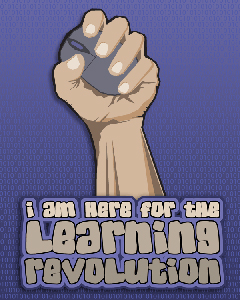
informal adult learning by the Department for Innovation, Universities and Skills.
Palomar5 Education organised a small, conspiratory event in reponse to Sir Ken Robinson’s call to bring on the learning revolution, a great opportunity to get some glimpses of how we will learn in the future through the lenses of Basti Hirsch, who went on a five-week education expedition through the United States; Aron Solomon, who is busy creating a boarding school with wheels, the Think Global School; and Margret Rasfeld, who founded a protestant reform school in Berlin. What have I seen?

And you? Photo by wfryer on Flickr.
I have seen three very different approaches to and understandings of learning and education by people who share the belief that—while public education remains a fundamental cornerstone of democratic societies—much of what happens in our institutions of formal education is wrong and represents a broken system.
I have also seen a few shared principles underpinning three schools that are so very different –
- the Science Leadership Academy, “an inquiry-driven, project-based high school focused on 21st century learning in Philadelphia,”
- the Think Global School, “a global, private and non-profit high school that travels the world and tosses educational sterotypes out of the window,”
- the Protestant Reform School, “a Berlin-based reform school aiming to introduce a radical change of learning culture.”
Many of these shared principles, I would guess, are key to most of the innovative education endeavours I know. Add to the list and share what you think in the comments!
We will learn in the future by
- following rhythms of inquiry and learning rather than rhythms of compartmentalised structures and times,
- moving away from memorising and teaching towards exploring and learning by doing,
- turning away from sitting and listening passively to constructing and collaborating actively,
- facilitating learning from failure instead of punishing every little mistake,
- accepting uncertainty as the only certainty there is within the complexity of learning,
- relating learning and living in ways that are fruitful and enriching both ways,
- not teaching what to learn and think, but by teaching how to learn and think,
- inventing and facilitating new and integrated learning formats, combining subjects and approaches,
- turning away from instruction and control towards facilitation and support,
- moving away from spaces controlled by educators towards spaces controlled by learners,
- providing encouragement and support instead of criticism and barriers.
Admittedly, this list is generic—quite possibly, too generic—but it’s a start. Wir fangen schon mal an.